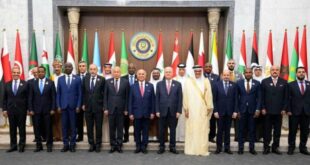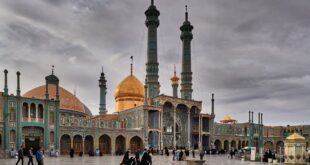 A STRING OF car bombs and other blasts killed at least 54 Iraqis on Tuesday, including 17 outside Baghdad’s most venerated Sunni mosque, while US troops battled Shiite gunmen in Baghdad.
A STRING OF car bombs and other blasts killed at least 54 Iraqis on Tuesday, including 17 outside Baghdad’s most venerated Sunni mosque, while US troops battled Shiite gunmen in Baghdad.
Seven more American soldiers died, the US military said, pushing the December death toll to 90 in one of the bloodiest months for the American troops in Iraq this year.
Some 105 troops were killed in October.
US President George W. Bush is weighing whether to send thousands more troops to Iraq, but a senior Democratic senator, Joseph Biden, said Tuesday he would fight such a move.
In the most lethal incident Tuesday, three parked cars exploded one after another in western Baghdad, police and Iraqi media reported. The blasts killed 25 people and wounded 55, one physician said by telephone, as he watched the victims being carried into Yarmouk Hospital.
The doctor, who has provided information in the past, spoke on condition of anonymity because of security concerns.
Perhaps the most politically significant attack came in Azamiyah, a Sunni enclave of Iraq’s capital, where a car bomb exploded near the Abu Hanifa Mosque, according to Iraqi media.
That blast killed 17 and wounded 35, said a physician at the nearby Nuaman Hospital, who has provided information to the Associated Press in the past. He also asked to remain anonymous out of concern for his safety.
The explosion tore through a busy square at the start of the evening rush hour, when merchants were selling clothing and kebabs. The mosque itself was not damaged, witnesses said.
The mosque is Sunni Islam’s holiest shrine in Baghdad, and a regular target of Shiite mortar teams. One person was killed in shelling there last month.
Abu Hanifa, who lived in the 8th century, was one of Islam’s most important scholars and founded the Hanafi School of Islamic Law, embraced by many Muslim cultures.
The mosque has long been associated with Sunni activism.
US Marines fought a fierce battle there on April 10, 2003, the day after the iconic Saddam Hussein statue fell in central Baghdad. Saddam and one of his sons were believed to be hiding nearby.
US troops, meanwhile, exchanged fire with Shiite gunmen in east Baghdad, near Sadr City, the stronghold of anti-American cleric Mouqtada Sadr.
An AP reporter embedded with the soldiers watched the Americans set up roadblocks, occupy homes and engage in gunbattles with fighters across the border of Sadr City.
US troops crouched on rooftops, hiding behind laundry hanging on a clothesline. Bursts of gunfire ricocheted off rudimentary cement houses.
The gunbattles waned as darkness fell. At least six mortars fell on a US military base nearby, but caused no injuries.
Sadr City is believed to be the chief base of operations for Sadr’s, Mehdi Army.
Pressured by Iraqi politicians in late October, American soldiers dismantled barbed-wire barricades that controlled traffic in and out of the area. Since then they have rarely ventured into the district.
The latest US deaths brought the number of members of the US military killed since the start of the Iraq war in March 2003 to at least 2,978 — five more than the number killed in the September 11 attacks in New York, Washington and Pennsylvania.
Bush has said the Iraq war is part of the United States’ post-September 11 approach to threats abroad. Going on the offence against enemies before they could harm Americans meant removing the Taleban from power in Afghanistan, pursuing members of Al Qaeda and seeking Saddam’s ouster in Iraq, Bush has said.
There has been no direct evidence of links between Saddam’s regime and the September 11 attacks. Democratic leaders have said the Bush administration has gotten the US bogged down in Iraq, detracting from efforts against Al Qaeda and other terrorist groups.
The AP count of members of the US military killed in Iraq includes at least seven military civilians. Prior to the deaths announced Tuesday, the AP count was 15 higher than the defence Department’s tally, last updated Friday.
At least 2,377 died as a result of hostile action, according to the military’s numbers.
Stanzel, the White House spokesman, said Bush grieves for each member of the armed forces who has died. “We will be fighting violent jihadists for the peace and security of the civilised world for many years to come,” he said.
While officials say Bush is considering all options in his hunt for a new strategy, the US president is thought to favour a surge of up to 30,000 more American troops .
Biden, the incoming chairman of the Senate Foreign Relations Committee, on Tuesday called that option “the absolute wrong strategy”, especially when it came to stabilising Baghdad.
“Even with the surge of troops, in a city of six million people you’re talking about a ratio that would still be roughly above one to 100,” Biden said.
In another Baghdad attack Tuesday, a bomb hidden in a CD player exploded in a busy market district after a man dropped it off at an electronics repair shop. The bomb killed five people and wounded 14 others, police said.
In Kirkuk, 180 miles north of the Iraqi capital, a roadside bomb killed three civilians — including an eight-year-old girl — and wounded six others, police said.
Police found 49 bodies bearing signs of torture dumped across the country, mostly in Baghdad.
Meanwhile in Amman, Prime Minister Marouf Bakhit said Tuesday that a former Iraqi Cabinet minister who escaped from a Baghdad prison this month had arrived in Jordan on a US plane.
Ayham Samaraie, a former minister of electricity with dual US and Iraqi citizenship, was serving time for corruption when he escaped in mid-December.
Lou Fintor, spokesman for the US embassy in Baghdad, said the US government was not involved in the escape “in any way”.
Bakhit told reporters that Jordan did not receive any request from Iraqi authorities to extradite Samaraie.Â
 Eurasia Press & News
Eurasia Press & News



